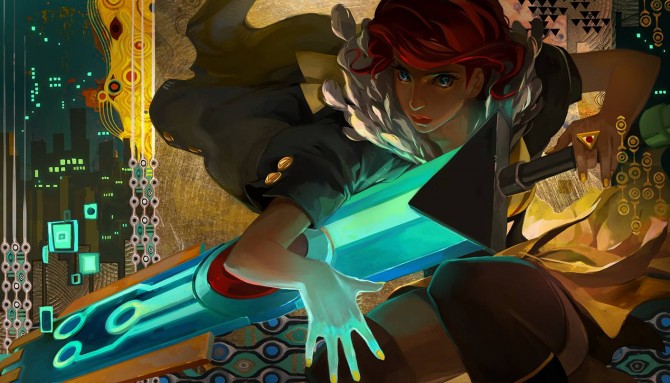Transistor Review - Giant Swords Rock

Supergiant Games have their work cut out for them. Their first game, Bastion, was released to huge critical acclaim, with many saying it was the best downloadable Action RPG available for a long time - and it’s easy to see why. Bastion had fantastic music, awesome combat, an interesting story and in one package it made a very unique, memorable experience that I would recommend to everyone. So yes, if Transistor doesn’t want to disappoint the fans of Bastion and the high hopes that has been set for it, Transistor really has to be something special…

Transistor is what I would like to call an Action Adventure, with an influence from Tactical RPGs. The game takes the same perspective as Bastion, with a pseudo-isometric camera angle pointed towards the level from above, where you can see your player character, Red, and the titular sword, the Transistor.
The digital world of Transistor is very much in ruin. Something known only as The Process is slowly wiping out residents, buildings and more, leaving sterile-looking white walls adorning the place, almost as if the beauty and charm of the areas you move through is slowly being deleted. All you know is that it was supposedly started by a small group called The Camerata, and they should be punished. If the story sounds complex or confusing, this is perfectly normal at this stage, but all becomes clear eventually.
Very little is explained about what is happening near the beginning of the game, with the player thrust into the world with little idea of what is going on. Instead you explore and stumble upon some enemies, which is where the meat of the game - the combat - finally shows itself.
Combat, much like the rest of the game, takes a lot of inspiration from Bastion. You earn Functions through levelling, and Functions can be set as attacks, or can be applied to an existing Function to upgrade its abilities. For example, a Function by itself can be used to create explosives in the near area, but when that Function is used to upgrade another, the original move stays the same but has an added Area of Effect damaging enemies in a larger area. Functions can also be applied to Passive slots, giving constant bonuses. You can only set functions if you have enough Memory for it. Memory acts as a limit to how many Functions you can set, each Function requires anything between one and four MEM. More MEM can be unlocked through levelling, although I never found the restriction to be too tight.
The huge variety in builds that comes from this system is staggering, and Functions can be swapped out of Active, Upgrade and Passive slots quickly and easily, meaning you can consistently experiment with the moves you use every other battle to find one which is right for you. This is all without mentioning one of Transistor’s most important points, which is Turn.
Turn is just that, an opportunity you can take to set up attacks. During Turn you can organise where you stand and what attacks you use, giving you a huge advantage over your enemies. Only problem is, the more you decide to do in your turn the longer you will have to wait in Real Time for your abilities to recharge, giving enemies an excellent opportunity to attack. Knowing when it is best to use Turn and which abilities to use is very important to achieve victory. Although Turn offers a hugely interesting new take on the Action RPG genre, introducing a level of tactics and strategy to a genre which often relies on button mashing, I can’t say Turn felt great to use. It was effective, but watching the attacks I selected play out instead of playing them out myself made me feel somewhat disconnected from the game. All in all, it made me resent using Turn, as it killed enemies efficiently, but removed what I felt was fun about the combat system.
The story is told through the Transistor, and a voice emanating from it acts as the narrator for the game. In Bastion, the narrator simply explained to the player what was happening, in Transistor however, the narrator is talking directly to the player character, Red. As it turns out, these two have quite the history, and Red has more than one reason to drag around this huge sword and go against The Camerata. The story is quite short, and the Transistor’s voice isn’t as charming as Bastion’s narrator, nor anywhere near as comprehensive. As someone who found the fantastic narration to be one of Bastion’s strongest features I was elated to find it had made a return, but it neither feels the same or is as interesting.
The world Red and the Transistor exist in is beautiful, however. The isometric perspective adds much more than you would expect, in certain scenes it literally seems as though brush strokes had been made in the sky above Red, offering a level of artistic beauty rarely seen in games. Honestly, it was lovely, and fixing the perspective offered for artistic elements I had never considered before. A genuine surprise, and genuinely beautiful to look at, much like the rest of the game. I may have a few gripes with the game, but graphics simply cannot be one.

Music is another beautiful note. The soundtrack is good enough to put on your iPod, just like Bastion’s, but unlike Bastion, once again it failed to truly enrapture me. Bastion at times silenced me with how beautiful the game could be when coupled with some haunting music, but Transistor never did this for me, sadly. Is the music beautiful? Yes. Is it applied in a way which highlighted how beautiful it was? I don’t think so, it seemed more like background noise whilst playing the game. If you take your time to listen to it, you’ll find it is quite lovely.
